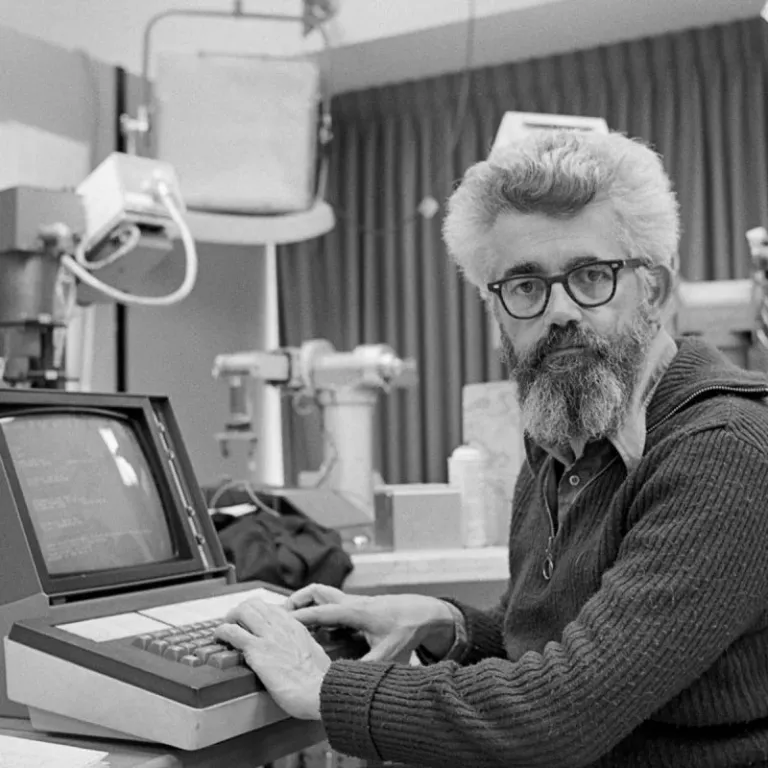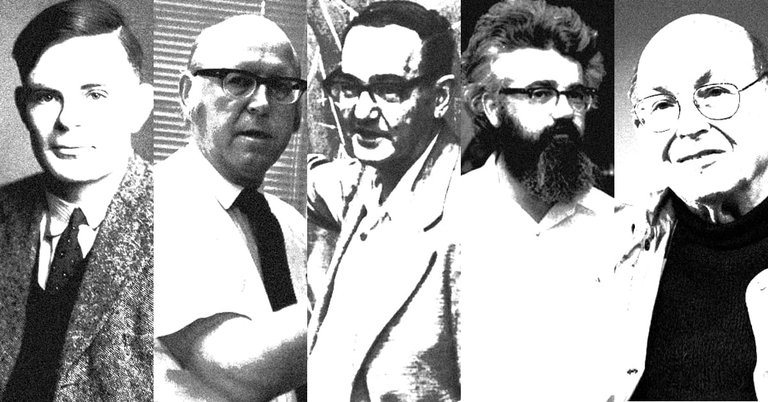Who invented Artificial Intelligence?

The concept of artificial intelligence (AI) has captivated the minds of thinkers for decades, but when it comes to pinpointing a single inventor of AI, the task becomes complex because it is a field built upon the contributions of many brilliant individuals. If one must look for a seminal figure, however, John McCarthy is often heralded as the “father of artificial intelligence.” Who invented artificial intelligence?
In 1956, McCarthy, along with Marvin Minsky, Nathaniel Rochester, and Claude Shannon, organized the famous Dartmouth Conference, which marked the birth of AI as an academic field. At this historic event, the term “artificial intelligence” was coined and defined as the science and engineering of making intelligent machines. The legacy they sparked continues to carry profound implications across industries, redefining the way we interact with technology and blurring the lines between human and machine intelligence. The advancement in AI has been exponential since its inception, unlocking extraordinary possibilities that its early pioneers could have only dreamed of.
History of Artificial Intelligence
Building on the rich tapestry of the “History of Artificial Intelligence,” a pivotal question arises that piques the curiosity of many: Who can be credited with the groundbreaking invention of artificial intelligence? The answer is not attributed to a single individual but to a cohort of visionary pioneers. It is often John McCarthy, an American computer scientist, who is hailed as the “Father of Artificial Intelligence,” owing to coining the term itself during the seminal Dartmouth Conference in 1956. Alongside Marvin Minsky, Allen Newell, and Herbert A. Simon — who were instrumental figures — McCarthy laid the foundational concepts that stream into the flow of AI as we know it today.
Their collective efforts in the mid-20th century catalyzed a sequence of revolutionary developments in computational theory and practice, setting the stage for a world where machines could begin to simulate intelligent behavior. To explore the intrigue and contributions of these innovators further, it’s essential to delve into the individual milestones they achieved, each adding a vital element to the intricate mosaic of artificial intelligence’s inception.

Who is Credited with Inventing Artificial Intelligence?
Following the section “Who is Credited with Inventing Artificial Intelligence?”, it is essential to delve deeper into the roots of this groundbreaking technology. The inception of AI can be traced back to a pivotal moment in history, known as the Dartmouth Conference of 1956, where the term ‘Artificial Intelligence’ was first coined. This conference was orchestrated by John McCarthy, a visionary computer scientist, who, along with pioneers like Alan Turing, Marvin Minsky, Allen Newell, and Herbert A. Simon, laid the groundwork for AI.
Alan Turing, a British polymath, had previously explored the concept of machines that could compute and think, leading to his famous Turing Test, which still serves as a theoretical model for gauging a machine’s capability to exhibit human-like intelligence. These intellectual titans collectively kickstarted a journey of innovation and exploration that has led to the sophisticated AI systems we witness today. Their legacy is not only a testament to human ingenuity but also serves as the bedrock upon which current and future AI advancements continue to build. Thus, unraveling the origins of artificial intelligence provides readers with a crucial understanding of how far we have come and anticipates the transformative potential AI holds for our future.
When was artificial intelligence first developed?
Understanding the origins of artificial intelligence requires delving into a rich history of ideas and innovations. Often considered the “father” of artificial intelligence, John McCarthy coined the term “artificial intelligence” in 1955 and subsequently organized the famous Dartmouth Conference in 1956, where the concept was formally launched as an academic field. However, the pioneering groundwork was laid much earlier by luminaries such as Alan Turing, whose famous Turing Test provided a foundational question of machine intelligence: can a machine exhibit behavior indistinguishable from that of a human?
Other notable contributors include Claude Shannon, the father of information theory, and Marvin Minsky, who made substantial contributions to the theory and practice of artificial intelligence. Together, these visionaries planted the seeds of a science that would later blossom into today’s sprawling landscape of AI technology. As we explore their seminal work – the algorithms, theories, and machines that now underpin modern AI – we pay homage to the intellectual giants upon whose shoulders the field firmly stands.
1940-1960: Birth of Ai In the Wake of Cybernetics
Following the cybernetic fervor of the mid-20th century, the timeline of artificial intelligence burgeoned into a rich tapestry of innovations and milestone achievements, spearheaded by brilliant minds determined to unravel the complexities of machine learning and cognitive computation.

It’s crucial to acknowledge that AI, as a field, doesn’t have a single inventor; rather, it’s the product of collaborative genius. The 1960s saw figures like John McCarthy and Marvin Minsky, who organized the famous Dartmouth Conference in 1956 where the term “Artificial Intelligence” was first coined, and Allen Newell and Herbert A. Simon, who developed the Logic Theorist and General
What Was the First Artificial Intelligence Program Created?
Building on the foundation of what constituted the first artificial intelligence program requires a journey into the remarkable minds that pioneered the field of AI. The enigmatic question of “Who Invented Artificial Intelligence?” takes us back to the mid-20th century when a visionary collective of mathematicians, psychologists, and engineers first conceived the algorithms that imitate cognitive functions. John McCarthy, widely acknowledged as the father of artificial intelligence, coined the term “Artificial Intelligence” in 1955.
Alongside McCarthy, luminaries like Alan Turing, who formulated the concept of machine intelligence with his Turing Test, as well as Marvin Minsky, Claude Shannon, and Nathaniel Rochester, contributed seminal work that set the framework for AI. Their collective effort culminated in the Dartmouth Conference of 1956, often cited as the official birthplace of AI as a field of study. These innovators not only invented the conceptual fabric of artificial intelligence but also paved the way for future technological advancements that continue to reshape our world. As their legacy endures in today’s digital age, the quest to understand and develop AI further has become a central theme in modern technological discourse.
How Has Artificial Intelligence Evolved Since Its Invention?
Since its inception, the evolution of Artificial Intelligence (AI) has been nothing short of remarkable. The pivotal moment can be traced back to the mid-20th century, when a group of formidable mathematicians, logicians, and computer scientists laid the groundwork for what would become the field of AI.
Among these pioneers, Alan Turing is often credited with formulating the foundational ideas that would shape the future of intelligent machines. Turing’s seminal paper, “Computing Machinery and Intelligence,” posed the famous question “Can machines think?”, which sparked decades of inquiry and research. Following Turing’s lead, researchers like John McCarthy—who is widely acknowledged as the father of AI for coining the term “Artificial Intelligence”—along with Marvin Minsky, Allen Newell, and Herbert A.
Simon, made significant contributions that propelled the field forward. These brilliant minds laid the cornerstone for the development of AI by establishing key concepts, hosting the Dartmouth Conference in 1956, and driving innovation that would lead to the creation of the first AI programs. Since then, the field of AI has witnessed numerous waves of advancement, from rule-based systems of the early years to today’s sophisticated machine learning algorithms and neural networks that mimic the human brain’s structure and function.
The journey of AI has been marked by extraordinary milestones, such as the development of expert systems in the 1980s, the resurgence of neural networks in the 1990s due to increased computational power, and the recent explosion of deep learning technologies that have begun to outperform humans in tasks ranging from image recognition to strategic game playing.
Why is the Invention of Artificial Intelligence Considered Significant?
The landmark invention of artificial intelligence (AI) is a testament to the innovative capabilities of humanity, and it has intricately woven itself into the fabric of modern society. It’s important to credit the brilliance behind this transformative technology, as the question ‘Who invented artificial intelligence?’ leads to a fascinating story of thinkers, tinkerers, and theorists.
John McCarthy, often recognized as the father of AI, coined the term “artificial intelligence” in 1955 and organized the famed Dartmouth Conference in 1956, where the journey of AI as a distinct field began. His pioneering work, along with contributions from other visionaries such as Alan Turing, Marvin Minsky, Allen Newell, and Herbert A. Simon, laid the foundation for the algorithms and computational processes that drive today’s AI systems.
These researchers not only envisioned machines that could simulate human intelligence but also developed early methods to enable computers to learn and make decisions. This rich history of AI underscores its significance not just as a technological advancement but as a revolution that has reshaped industries, economies, and daily life.
Today, as AI continues to evolve at a breathtaking pace, understanding its origins helps us appreciate its potential and ethically guide its future. As we delve deeper into the chronicles of AI, we unfold insights into its incredible journey from a theoretical concept to a core component of modern innovation, dramatically altering the way we work, learn, and interact.